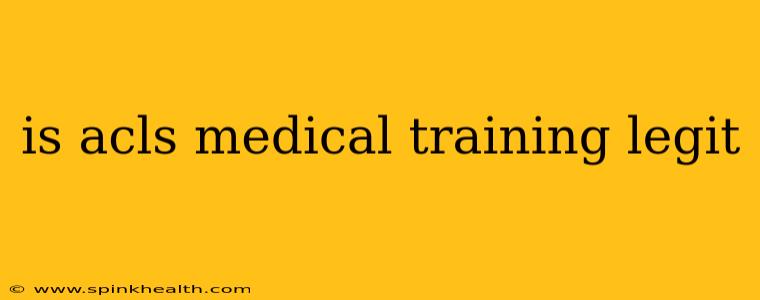Is ACLS Medical Training Legit? Navigating the World of Advanced Cardiac Life Support Certification
The world of medical certifications can be a maze, especially when it comes to life-saving skills like Advanced Cardiac Life Support (ACLS). Finding a legitimate ACLS training provider is crucial, not only for your professional development but also for the safety of your patients. So, is ACLS medical training legit? The short answer is: yes, but it's essential to be discerning. The legitimacy hinges on the provider, not the certification itself.
Let's unravel the intricacies of ACLS training and how to determine if a provider is truly trustworthy. My journey into understanding this began with a frantic search for a reputable provider after a colleague recommended updating my certification. The sheer volume of options, ranging from pricey weekend seminars to online courses that promised certification in a few hours, made me wary. This experience underscores the critical need for careful investigation before choosing a provider.
What is ACLS Certification?
ACLS certification signifies that a healthcare professional possesses the advanced knowledge and skills necessary to manage cardiac arrests and other life-threatening emergencies. This isn't just a piece of paper; it represents a commitment to mastering complex procedures and making critical decisions under pressure. The training covers a wide range of topics including rhythm interpretation, defibrillation, advanced airway management, and drug administration.
How to Spot a Legitimate ACLS Training Provider
My research revealed several key factors to consider when choosing an ACLS training program:
1. Accreditation: This is the cornerstone of legitimacy. Reputable providers are accredited by recognized organizations such as the American Heart Association (AHA) or the American Academy of Family Physicians (AAFP). Look for clear evidence of their accreditation on their website. Don't hesitate to contact the accrediting body directly to verify.
2. Instructor Qualifications: Ensure your instructors are qualified and experienced healthcare professionals with the necessary certifications and a proven track record. A provider’s website should clearly outline their instructors' credentials.
3. Course Content and Structure: A legitimate ACLS course should thoroughly cover all essential topics, including hands-on practice and simulated scenarios. Beware of programs that promise certification without sufficient training.
4. Cost Transparency: While price shouldn't be the sole deciding factor, be wary of exceptionally low prices, as they may indicate a lack of quality or legitimacy. Legitimate providers should clearly outline their fees and any additional costs.
5. Customer Reviews and Testimonials: Reading reviews from past participants can provide valuable insights into the quality of the training and the provider's reputation.
Frequently Asked Questions (FAQs)
H2: What organizations offer legitimate ACLS certification?
The American Heart Association (AHA) is a leading provider of ACLS certification, widely recognized across the healthcare industry. Other organizations, such as the American Red Cross, also offer ACLS training, but always verify their accreditation and instructor qualifications.
H2: How long is an ACLS certification valid for?
The validity period varies depending on the certifying organization, but it's typically two years. It's crucial to renew your certification before it expires to maintain your professional credentials and ensure you are up-to-date with the latest guidelines and best practices.
H2: Can I get ACLS certified online?
While some online ACLS courses exist, it's crucial to ensure they meet the same rigorous standards as in-person training, including hands-on skills practice and simulation. Many organizations offer blended learning options combining online modules with in-person skills sessions.
H2: Are there different levels of ACLS certification?
Generally, ACLS certification is a single level, covering the core skills and knowledge required for advanced cardiac life support. However, there might be specialized ACLS certifications targeted at specific healthcare settings or demographics.
H2: What happens if I fail my ACLS exam?
Most providers offer re-testing options if you don't pass the initial exam. The specific policy varies from provider to provider, so ensure you understand the retake policy before starting your training.
In conclusion, finding a legitimate ACLS training provider requires careful research and due diligence. By focusing on accreditation, instructor qualifications, course content, and customer reviews, you can confidently choose a program that will equip you with the skills and knowledge to provide high-quality emergency cardiac care. Don't rush the process; your patients' lives may depend on your choosing a program that prioritizes competence and safety.

